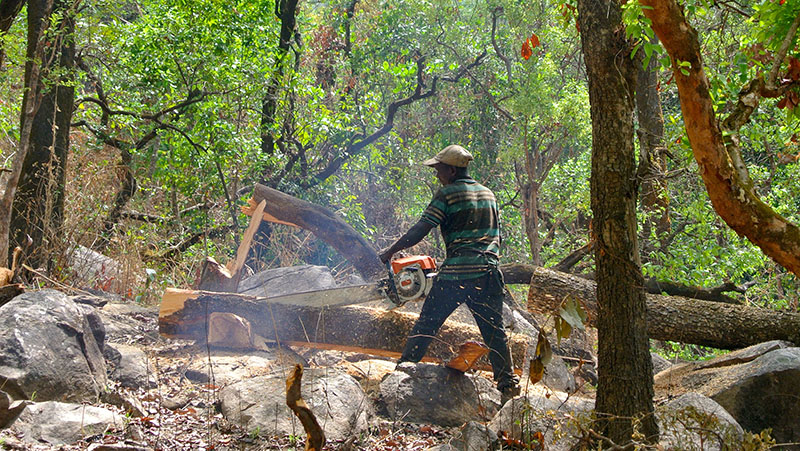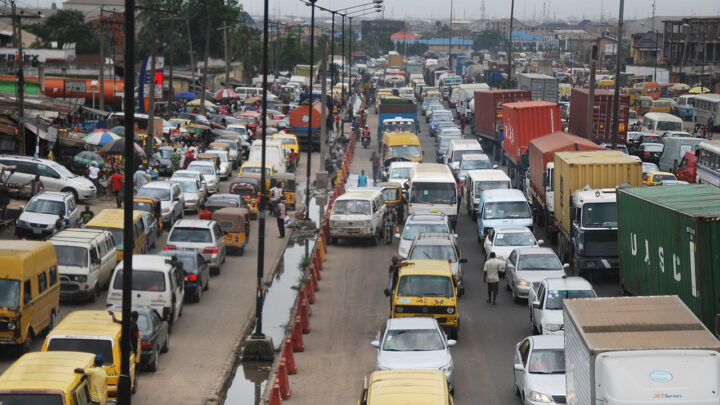For over 10 years, Vincent Tawo-Ebu, a farmer in Irruan community in southern Nigeria’s Cross River, battled with pile — a health condition that causes lumps inside and around the anus. Over the years, traditional medicines by herbalists have helped him manage it.
But in 2016, Tawo-Ebu fell very ill. When he visited his herbalist as usual to get treatment, he said the leaves used to treat his illness can no longer be found in the forests around his community.
Tawo-Ebu resorted to orthodox medicine for treatment but nothing much changed with the illness at a hospital. He returned to his hometown of Irruan and employed the services of able-bodied young men to go in search of the plant species to be used for his treatment.
Almost 20 km away from his community, the herb was found. “It was after the herbalist used the leaves for my treatment that I regained my peace and I’m currently not having any health complications,” Tawo-Ebu said.
Advertisement
But the forest near his community has almost been cleared as a result of deforestation, something that is making some medicinal plant species more difficult to find, says the farmer.

Now, deforestation is not only increasing climate risks in Nigerian communities but also cutting the access of many indigenous people to medicinal plants, as well as other impacts to their food and income sources.
Gabriel Ekpang, a farmer in the village of Bankpor, Cross River, said the rate of deforestation ongoing in his community is alarming. He mentioned that the intense scorch from the sun is killing off his crops and degrading his farmland.
Advertisement
“There are up to fifteen engines in my community now, cutting down trees. It is annoying. We are having too much sun, no more shed and it is destroying our farms and our crops,” Ekpang said.
From N300,000 ($729), his annual earning from the farm produce has dropped by half to N150,000 ($364). He said this is because the crops’ exposure to sunlight adversely affects nutrients and overall harvest.
Also, Obi Anthony, a youth leader and farmer at Irruan, said unlike before, he now has to use mulching and fertiliser on his farmland to get good yield but it still doesn’t produce as much as when the forest cover was intact.
Nigeria’s forest loss
Data from Global Forest Watch, created by the University of Maryland to monitor land use across the world, shows an alarming rate of deforestation in Nigeria.
Advertisement
In 2010, the country had 10.9 million hectares (Mha) of natural forest, extending over 12 percent of its land area, but in 2020, it had lost 97,800 hectares of natural forest.

The report further stated that the loss of forests generated around 59.5 million tonnes (Mt) of carbon dioxide (CO₂) emissions.
From 2010 to 2020, Nigeria lost 113.5 thousand hectares (kha) of humid primary forest, according to the monitoring platform. This shows a steady decrease in primary forests in the country.
The UN Food and Agriculture Organisation (FAO) states that deforestation in Nigeria occurs at an annual rate of 350,000 to 400,000 hectares per year.
Advertisement
Between 2015 and 2020, the rate of global deforestation was estimated at 10 million hectares per year, according to the same report. Nigeria accounted for about four percent of the global deforestation rate in the period under review.
According to the United Nations Framework Convention on Climate Change (UNFCCC), the total carbon content of forests was estimated at 638 gigatonnes (Gt) in 2005, which is more than the amount of carbon in the entire atmosphere. They help to suck carbon out of the atmosphere through photosynthesis.
Advertisement
But when trees are cut, their stored carbon is released. The International Union for Conservation of Nature (IUCN) states that around 25 percent of global emissions come from the land sector and about half of these (5-10 GtCO2e annually) comes from deforestation and forest degradation.
Affected communities
Deforestation is robbing indigenous communities of their homes, lives, and livelihoods, which typically depend on forests. About 25 percent of the world’s population depends on forests, according to the IUCN.
Advertisement
Taiwo Ogunwumi, an environmental risk expert said the high rate of deforestation in Nigeria is a result of agriculture, cutting down trees for fuelwood, urban expansion, timber production, ignorance of the need for forests and ineffective regulatory government policies.
“Agricultural activities lead to cutting down trees, urban expansion leading to road construction and developing places that used to be rural. Many people also rely on tree cutting for cooking, some of these people are ignorant of the values of the forest,” Ogunwumi said.
Advertisement

As a result of the rate of deforestation ongoing in Tawo-Ebu and Ekang’s communities, John Ewa, the local government chairman, gave wood loggers operating in the area a three-week ultimatum to vacate the forests.
He warned residents of local communities to stop aiding the loggers but instead to join forces and “stop this disaster that has come upon our land before it consumes us”.
Deforestation on reserved areas
Martins Egot is a farmer who practices agroforestry in Ekuri community of Cross River. Ekuri is one of the communities recognised globally for its Ekuri Initiative aimed at conserving and protecting its forests. But deforestation has infiltrated, said Egot.
Wood logging and timber trucks have destroyed the roads leading to the community and rendered them unmotorable, Egot said. So it has become difficult for the agrarian community to get their farm products to the road and then to the market.
“The timber trucks have created big ditches in the roads leading to my community. Now I can’t drive my car to my village any longer, I have to park my car in the nearest village that at least I can get access to and though I have to join a motorbike, I would have to stop and trek for another distance before I get to the community,” he said.
“So it has made me not visit my farm as frequently as I used to. It currently affects my productivity, the output is poor and I’m not able to expand. In a year I used to make up to 10 bags of cocoa and when sold at N50, 000 each, I’ll be making about a million, but now I only make like two bags and profit is low.”
Donatus Odey, a clan head in Irruan, said he has called on responsible government agencies to reinstate the forest guards, but to no avail.
He said deforestation has robbed his community, saying that some of the reserved areas were kept by the community for cultural purposes but these areas, which were sacred, have all been affected by deforestation.
Means of livelihood
Someone like Ekpang believes deforestation is now difficult to curb in his community because it has become a source of income for the locals. They cut down the trees and sell them to wood companies for profit.
Lindsay Stringer, a professor in environment and development at the University of York, said deforestation in Nigeria will continue because people do not have energy and livelihood alternatives.
“Protecting trees isn’t going to allow families to eat. And you’ve got a number of livelihoods that depend on that forest as well, you’ve got people cutting down and selling the wood, you’ve got all the people that make the charcoal, you’ve got the delivery drivers that earn a living from transporting all these, you’ve got bakeries and restaurants that depend on that fuel,” Stringer said
She said unless there were other viable and culturally acceptable energy alternatives that people can use for cooking, the demand on forests would continue to increase as Nigeria’s population increases and behavioural patterns don’t change.

Obsolete laws
Nigeria became a party to the Paris agreement in 2017. Part of the agreement provides that parties should take action to conserve and enhance, as appropriate, sinks and reservoirs of greenhouse gases, including forests.
There have been efforts by the federal government to conserve the nation’s forests, one of which was the ban on charcoal wood and charcoal exports but the success of that ban has been in question.
However, Rasak Kolawole, director, department of forestry, ministry of environment, said there is only so much the federal government can do to protect the country’s forests because the responsibility lies with the state.
Part of the things that hampers the efforts of the federal government are the obsolete laws still operational in most states of the federation, he said.
“Unfortunately most of those state laws are obsolete; the penalties of the 1950s, 1960s are still there. The penalties of paying one naira (N1), three Naira (N3) (less than a dollar). But some of the states are already reviewing their forestry laws. That’s the good thing about it but substantially those laws are still obsolete,” he said.
Messages and calls made to Hillary Bisong, member representing Boki LGA of Cross River in the state house of assembly, were not answered or returned.
As the world has begun the decade of ecosystem restoration, Ekpang and other indigenous people are asking the government to take decisive action to restore and preserve their forests.
Ekang is already warding off illegal loggers while carrying out afforestation activities in the forest areas around his farm. But he says he cannot do it alone.
Tawo-Ebu on his part is asking for the government to reinstate forest guards that would safeguard the forest from people destroying it.
“The government should empower the forestry commission, and forestry officers should return to their checkpoints. Non-professionals should hands off business,” Taiwo-Ebu added.
This report was originally published by Climate Tracker.






